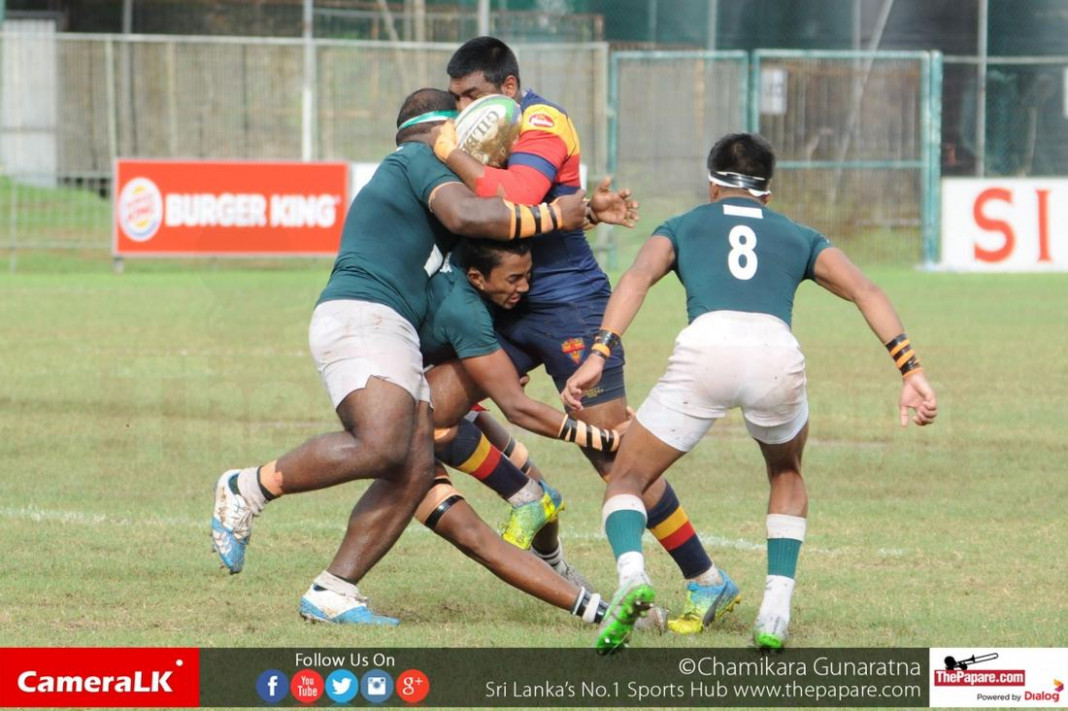I was fortunate enough to find myself at the Ceylon Rugby and Football Club ground on Saturday afternoon to experience two contrasting styles of Rugby, both played with intent and executed to a level that belied the wet and slippery conditions.
Before the game, the crowd stood for an impeccably observed minutes’ silence to honour the passing of Isipathana Old Boy Dayalu Perera. Dayalu Perera was the scorer of the first ever
Isipathana College try as part of the team of 1963 and has been part of Isipathana Rugby ever since. On the Monday evening after Isipathana played Wesley I was invited to a dinner with some Rugby stalwarts and Mr Perera was seated at the head of the table. He asked what everyone would like to drink. A juice and a Perrier were mixed in with the beer replies whereby Dayalu Perera turned to the waiter and ordered Mojito cocktails for the whole table. I had to laugh as it felt like we were all in our early 20s at university again. It wasn’t until later in the evening that I got to ask him why Isipathana College were so successful at Rugby. As he gave his reply he could not hide the fire in his eyes behind his glasses and at that moment I’m sure he felt like he was in his early 20s again too. PASSION is what he said and passion is what I saw and felt in his answer; an inspirational gentleman who loved Rugby with a passion. Vale Dayalu Perera.
Once I dried my eyes and the game kicked off we could see that each team had a game plan.
There is a game plan theory called 80 / 20 that states that teams focus 80% on their own team and 20% on the opposition during the planning and execution of training and game day.
I can’t say if Trinity College played to their strengths, as I’m not privy to where the team believes their strengths lie, but it appeared that they played the game to deny Isipathana College possession. Their forwards held the ball in close, for phase after phase. When the lonesome backs were delivered the ball it was put back in front of the pack with clever kicks into space that pinned Isipathana inside their own half. Only a supremely disciplined team can play such a strangling style of play for the full 40 minutes of each half. But with the coaches’ instructions still ringing in the Trinity team’s ears, this game plan looked like a winner for the first 20 minutes of each half.
For the second 20 minutes of each half Isipathana College’s game plan was there for all to see. Spread the ball from East to West, side line to side line. This plays into the hands of their team because they have a couple of straight running centres that keep defenses from drifting wide. The two other reasons this game plan works is that the forwards are willing to hit the ball up close to the ruck so they attract defenders and secondly they have a team attitude of attacking support play. When they spin the ball wide they always have players running support lines on the inside. This is an attitude that teams commit to and it takes players to work off the ball to always make themselves available.
Of course this is a simplified version of an outstanding display of two teams committed to two very different paths. The common denominator here is the work that both teams put in during the week at training to be able to execute their respective game plans. Their dedication to training gives them the belief on Saturday that their team can get the job done.
When you add supporters who have passion, like Mr Dayalu Perera, then you have what some call a perfect storm where Rugby, life and death all meet to watch 30 men chase a leather ball around a paddock.















